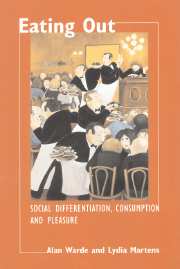Book contents
Part II - Access
Published online by Cambridge University Press: 22 September 2009
Summary
Access to consumption opportunities is controlled by a wide range of different social rules or conventions. Rules of access, which may be enabling or exclusionary, are a defining element of the character of a production–consumption cycle. The nature of the gate-keeping rules conditions the quality of the social relations involved in the delivery and enjoyment of any service and often determines the social and symbolic significance of the activity. Systems of regulating access are highly significant because the range of consumption activities to which one has access are vital aspects of the quality of everyday life, social reproduction and material opportunities. The market is democratic in the sense that it surpasses exclusionary social barriers except wealth, access to goods being open to anyone with sufficient funds to purchase them. Other modes apply more particular criteria. Access may be guaranteed as a right, as with emergency health care in the UK. Access may be by invitation or election, as with membership of private clubs. Sometimes access is strongly influenced by birth or family of origin, as with religious communities and private schooling. And sometimes rules of informal social exchange apply; obligations of reciprocity, often negotiated and not necessarily symmetrical, are the principle of inclusion for dinner parties and celebratory events. These gate-keeping devices mediate the flow of goods and services and are part of a process whereby different people obtain different levels and qualities of consumption.
It follows that consumption levels will be unequal, between individuals and between groups.
- Type
- Chapter
- Information
- Eating OutSocial Differentiation, Consumption and Pleasure, pp. 65 - 68Publisher: Cambridge University PressPrint publication year: 2000

